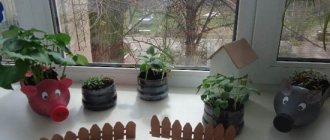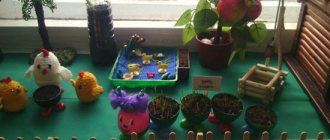Project at the preschool educational institution “Useful and entertaining advice from Uncle Zhora Lampochkin”
- May 27, 2015
Conference “Project activity in an educational institution - 2015”
Nomination “Pedagogical project in a preschool institution”
Relevance of the project topic. One of the most pressing problems of the modern world is saving electrical energy and finding ways to conserve energy resources. In the process of implementing the task of developing the fundamentals of energy saving in preschoolers, a contradiction between the need to carry out this work on the basis of material that preschoolers can understand, and the presence in the methodological literature and Internet resources of information and reference materials that solve this problem.
The idea of resolving this contradiction is to develop and implement a project to teach preschoolers the basics of energy saving, the participants of which are teachers, preschoolers and their parents. Joint work on the project will increase the interest of preschoolers and their parents in the problem of energy saving, expand their knowledge in this area, and will also help strengthen parent-child relationships in the process of joint activities.
The goal of the project: to educate preschool children of an elementary culture of energy saving through the organization of various types of joint activities of the teacher, students and their parents.
Project objectives.
For pupils:
1. Enrichment and systematization of preschool children’s knowledge about electricity and methods of its generation.
2. Development of interest in the problem of saving energy resources.
3. Development of skills of economical behavior in relation to energy resources.
4. Development of intellectual abilities in preschoolers, the ability to compare facts, phenomena, objects, compare and analyze them.
5. Improving skills in working with an interactive whiteboard and multimedia equipment.
For the teacher:
1. Creating conditions for familiarizing pupils with energy resources and their production through enriching the subject-development environment and a system of activities with pupils and their parents.
2. Consolidating skills in organizing project activities with preschool children.
3. Development of ICT competence of the teacher.
4. Formation of skills in working with an interactive whiteboard, multimedia equipment and Internet resources.
For parents:
1. Involving parents and other family members of pupils in joint activities and participation in preschool educational institutions projects.
2. Activation of the creative potential of parents of pupils.
3. Ensuring favorable, emotionally rich relationships between parents and children.
4. Increasing the pedagogical competence of parents, enriching their educational experience.
Type of project: informational, research, creative.
Project duration: short-term (5 weeks).
Project implementation period: October 2014 – November 2014.
Project participants: teachers, children of senior preschool age, parents.
Project leader: senior teacher.
Project working group: teachers of senior and preparatory school groups.
Expected results:
1. Expanding the horizons of preschoolers about energy resources and the culture of energy saving.
2. Development of energy-saving behavior skills among students and their parents.
3. Development in pupils of curiosity, creativity, cognitive activity and the ability to use acquired knowledge in various activities and behavior.
4. Harmonization of parent-child relationships.
5. Development of ICT competence of teachers, students and their parents.
Project product: an electronic book “Useful and Entertaining Advice from Uncle Zhora Lampochkin” created by teachers, students and parents in joint activities, containing text, photo, audio and video information that is understandable and usable for children of senior preschool age.
Stages of project activities.
1. Preparatory stage – 1 week.
2. Practical stage – 3 weeks.
The materials accumulated during the implementation of the practical stage of the project are summarized in the form of an e-book “Useful and entertaining advice from Uncle Zhora Lampochkin.” The book contains an information block, educational tasks, photographs of the work of preschoolers and their parents, as well as video materials from Internet resources and our own production.
The final stage is 1 week.
Appendix 1. Pedagogical project
Appendix 2. Electronic book.
Author: Elena Vyacheslavovna Oreshenkova, senior teacher at MBDOU DS No. 24 in the city of Smolensk.
Progress of the game
I have an envelope with questions. Let's try to answer them.
— The new energy-saving light bulb is better because (It lasts longer than a regular incandescent lamp, saves energy , has less negative impact on the environment, etc.)
— Mom and Dad replaced the old light bulbs with energy-saving ones because...
— Electricity must be conserved , because...
— You can’t turn on many electrical appliances at the same time, because….
- If you don’t turn off the lights day and night, then...
- If all the light bulbs in the whole house suddenly went out, then...
— The street lights stopped shining, so...
Word game "Is it true?"
Goal: to clarify children’s ideas about safe handling of electrical appliances, careful use of energy and heat.
Progress of the game
The teacher reads the sentence. If the children agree, they clap their hands. If you don’t agree with a statement, stomp your foot.
Is it true that...
— When leaving, do you need to turn off the lights?
— can you turn off electrical appliances from the outlet by pulling the cord?
-Shouldn’t you touch electrical wires with wet hands?
— Is it possible to dry clothes and linen on the radiator?
- Do you need to cover your windows for the winter?
— Do you need to wipe the dust off the light bulbs to make them shine brighter?
- When you are at home, do you need to turn on all electrical appliances?
— Should I use energy-saving light bulbs ?
— Is it forbidden to insert foreign objects into the socket?
Game “Where the Light Bulb Lives”
Goal: to consolidate children’s ideas about electrical appliances and stimulate the development of coherent speech.
Game actions: select pictures depicting objects that have a light bulb, indicate its place on the object using a small symbol, explain its purpose.
Material: pictures depicting various objects; red cardboard circle.
Summary of a lesson on energy saving for middle group children. "Learning to save"
Lesson in the middle group on energy saving “Bear visiting the guys”
Software tasks:
• To form children's idea of a careful, economical attitude towards electricity and natural resources.
• Develop attention, memory, thinking, imagination and speech; ability to classify household appliances.
• To educate children in correct safe behavior with household electrical appliances.
Game equipment:
bear toy, light bulb, toy and real electrical appliances, pictures on energy saving.
Preliminary work:
• reading works of fiction: P. Andreenko “Rain”, “How the boy Petya learned to close the door behind himself”, asking riddles, looking at illustrations and talking about the book
“Technology in your home”, creation of an exhibition of children’s creative works “Learning to save energy”;
• didactic games “Light, water, sound”, “Basics of safety”
A bear (a toy or an adult in a suit) came to visit the children.
Bear:
Hello guys! Did you find out which fairy tale I'm from? ("Masha and the Bear"). Masha lives with me. In my small house the light is on all day long so that Masha can have light. And at night Masha is afraid to sleep without light, she won’t turn it off. Do you do this too? (Children's answers).
Educator
: Hello, Mishka! Guess the riddle with the guys: The house is a glass bubble, and a light lives in it! During the day he sleeps, and when he wakes up, he will light up with a bright flame.
Look what I have in my hands? (Bulb). Bear, is this light on for you? (Yes). Guys, can you tell me what the light bulb is for? (Children's answers). Yes, we turn on the light bulb so that the room is light; it is powered by electric current. And look at our group of light bulbs? (Larger lamps and they shine brighter). And if the sun is shining and it’s so bright, do you need to turn on the lights? (No, you need to save light, take care of it, not waste it - when the sun is shining, you don’t need to turn on the light bulb). Do you guys sleep with the light on at night? (Children's answers). To get a good night's sleep, you don't need to turn on the lights at night. Let it not burn in vain. Electricity is the most important part of our life! Without it, no machine can work. The current runs through the wires, bringing light into our apartment.
For the devices to work:
Fridge,
Monitors, Coffee grinder, vacuum cleaner, Current brought energy.
The first assistant in the house is our devoted and faithful friend.
Educator.
Now do you understand how important the light bulb is in our lives? Without her, the whole world would become dark and gloomy. In order for our world to be illuminated by electricity, we must treat it carefully, economically, be attentive, turn off lights and electrical appliances on time so as not to waste electricity. If everyone saves, the country will make a big profit.
Guys, let's tell Mishka what devices are plugged into the socket. (Iron, computer, TV, vacuum cleaner...) (We show Mishka some electrical appliances)
Physical education
Children pretend to be a light bulb.
When the word “doesn’t burn”, children crouch down and cover their eyes with their palms; when the word “burns” sounds, they stand up and stretch their arms up. You can read in the evening, jump, run, squat.
This is magical, the electric sun!
Bear:
Everything is clear to me now!
I will make sure that Masha does not turn on the lights in vain and saves electricity. Water Saving
Bear:
Guys, Masha’s water runs a lot when she washes herself.
It'll be sprayed all over while it's washed.
Educator:
Guess the riddle with the guys.
She is in the lake, she is in the puddle,
She is circling above us like a snowflake,
It boils in our kettle too,
She also runs in the river. (Water)
Bear:
Do you also wash your face like Masha? (Children's answers)
Finger game “We wash ourselves”
Shall I tell you where we were?
We walked to the river on the water, (we walk with two fingers on the table with both hands)
They brought some water in a bucket (we put both palms together like a ladle)
So that all the kids can wash themselves, (we wash ourselves)
Wash our ears, our eyes, (we show)
And cook porridge for breakfast. (circular movements with right hand)
Educator:
you see, the tap needs to be opened quietly so that the water flows in a thin stream. Water must also be conserved, because water can run out, and it is impossible to live without water.
Children, let's tell our hero why we need water. (Drink, cook, eat, wash, bathe, wash dishes, wash clothes). Do animals need water? (Yes) Why do animals need water? (Answers) What about the birds? (Answers) What about trees and plants? (Answers) What about the fish? (Answers) Where does water live? (in the sea, lake, river, spring, tap). What kind of water can you drink? Only fresh, not salted. There are few fresh water reserves on earth, and they are becoming less and less every year. There are countries on the planet where there is very little fresh water and people are forced to buy it for money. Children, let's tell our guest how you can save water. (Children's answers)
Educator:
Water must be respected -
Everyone should know this! It's no secret at all -
We have no life without water! Neither wash nor drink, And we will not be able to enjoy Neither nature nor the landscape Without water, everyone will fade away!
You need to save water, do not open the tap too much, the stream of water should be thin. Do you know how to save water?
How?
— If you wash your hands or face, don’t forget to turn off the tap.
— If you see that water is flowing from the tap or it is not working properly, close the tap.
— You should not brush your teeth under running water, but use a glass. Guys, you are so great! As you told our guest a lot and interestingly, you know how you can save and conserve water.
Bear:
It’s so warm here, you don’t want to leave! Masha, of course, is a good girl. She's just young and doesn't know much. It’s cold outside, and Masha doesn’t close the door well, even the hot stove doesn’t heat up.
Educator:
It’s clear that it’s okay to heat in your house, or to warm up by the fire in the yard. A lot of firewood will be lost, but there will be no heat. Guys, what do you think they need to do to keep the house warm? (Insulate the windows, close the doors and vents tightly, do not curtain the radiator) You insulate the windows, seal the cracks in the house, it will be warmer! Otherwise, you will burn all the wood, and the heat will escape through the cracks into the forest. Yes, it’s warm in our group! Olga Vasilyevna sealed all the cracks in the windows. Look. And we close the doors tightly so that the cold doesn’t come in. We also save heat, like light and water. So that the cold winter
Didn't sneak into your houses
You insulate the windows -
And live in warmth!
Educator:
Let's look at the pictures and remember what we talked about today. (Showing pictures on the topic of energy saving)
And heat, and water, and light don’t just flow, And nature doesn’t give them to us for free Among the many problems in our generation, the issue of Energy saving has to be resolved!
Bear:
thanks guys, I see that you know everything. I'll go home and teach Masha to save light, heat and water. Goodbye!




